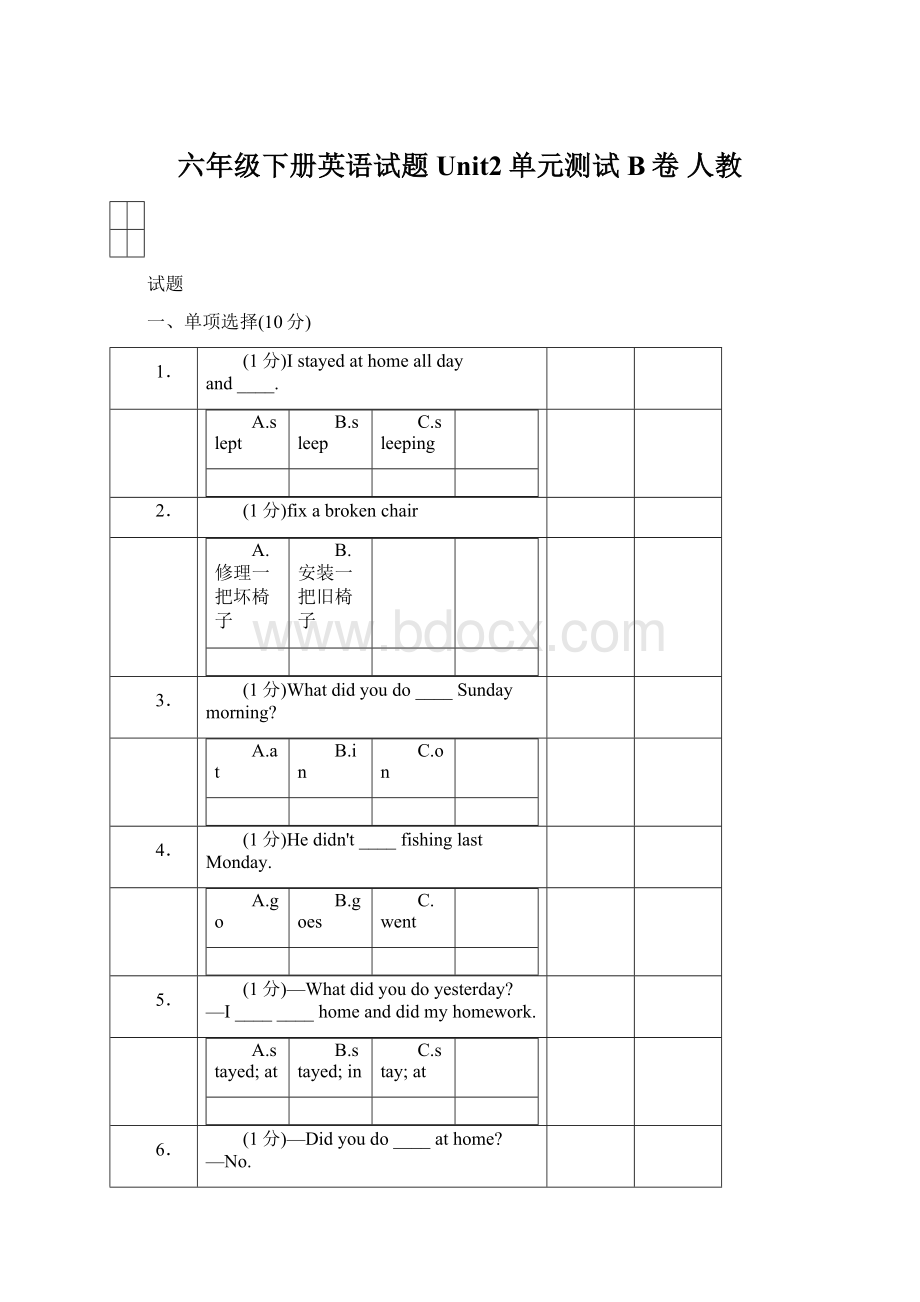六年级下册英语试题Unit2单元测试B卷 人教.docx
《六年级下册英语试题Unit2单元测试B卷 人教.docx》由会员分享,可在线阅读,更多相关《六年级下册英语试题Unit2单元测试B卷 人教.docx(25页珍藏版)》请在冰豆网上搜索。

六年级下册英语试题Unit2单元测试B卷人教
试题
一、单项选择(10分)
1.
(1分)Istayedathomealldayand ____.
A.slept
B.sleep
C.sleeping
2.
(1分)fixabrokenchair
A.修理一把坏椅子
B.安装一把旧椅子
3.
(1分)Whatdidyoudo ____Sundaymorning?
A.at
B.in
C.on
4.
(1分)Hedidn't ____fishinglastMonday.
A.go
B.goes
C.went
5.
(1分)—Whatdidyoudoyesterday?
—I ________homeanddidmyhomework.
A.stayed;at
B.stayed;in
C.stay;at
6.
(1分)—Didyoudo ____athome?
—No.
A.everythingelse
B.anythingelse
C.elseanything
7.
(1分)Mr Alextalked____alotofnewfilms.
A.with
B.about
C.to
8.
(1分)—WhatdidyoudolastSunday?
—____.
A.No, Ididn't
B.Iwentfishing
C.Iamreadingabook
9.
(1分)Didyou ____yourclothesontheweekend?
A.wash
B.washed
C.washes
10.
(1分)What____Mikeusuallydoeveryday?
A.do
B.did
C.does
二、单词拼写(9分)
11.
(5分)看图,补全单词或短语。
(一般过去时)
(1)
h __dac__ __d
(2)
sl ____t
(3)
s ____af __ lm
(4)
dr ____kt __ __
(5)
w __sh __ __cl __th __ __
12.
(4分)写出下列动词的过去式形式。
(1)
is→
(2)
do→
(3)
stay→
(4)
wash→
(5)
watch→
三、补全对话(10分)
13.
(10分)选择合适的句子补全对话。
Robin:
1
Alan:
Itwasgreat.IwenttoHainan.
Robin:
Soundsgreat.Whatdidyoudo?
Alan:
2
Robin:
3
Alan:
Yes.Myfatherisstrongerthanme. 4
Robin:
5
Alan:
Iwentboating.Ah.Itwasreallyahappyweekend.
A.Iwentswimming.
B.Whatelsedidyoudo?
C.ButIswamfasterthanhim.
D.Howwasyourweekend?
E.Didyougowithyourparents?
四、翻译(5分)
14.
(5分)选出下列句子的正确中文意思。
A.我想看电视,但电视坏了。
B.我们下午喝了咖啡并且看了电视。
C.你前天做了什么?
D.乘公交车比走路更快。
E.他昨天感冒了吗?
(1)
Whatdidyoudothedaybeforeyesterday?
(2)
Didhehaveacoldyesterday?
(3)
IwantedtowatchTVbuttheTVdidn'twork.
(4)
Takingabusisfasterthanwalking.
(5)
WedrankcoffeeandwatchedTVintheafternoon.
五、选词填空(10分)
15.
(10分)
①broken②watch③listened④book⑤cleaned
⑥night ⑦hotel ⑧enjoy ⑨lamp ⑩small
Dearsir,
Ourweekendatyour wasbad.Ourroomwas andeverythingwasveryold.OurfriendRobin ourroomandfixeda table.
Myfatherwantedtoreada ,butthe wastoosmall.Mymotherwantedto TV,buttheTVdidn'twork.ThepeopleinRoom512 toloudmusic.Ididn'tsleepall .
I'msorry,butwedidn't ourstayverymuch.
Sarah'sfamily
六、阅读理解(20分)
16.
(10分)阅读短文,判断正误。
Lastweekwelearnedalotfromsocialstudies.Welearnedaboutsomeinterestinganimals.Theyarecalleddinosaurs.Dinosaurswerehugeanimals.Theylivedmillionsofyearsago.Theyweretall,bigandstrong.Somecouldranveryfast,butsomeonlywalkedslowly,somecouldfly.Somedinosaursategrassandplantsandsomeatemeat.
(1)
Welearnedaboutsomeinterestinganimals.
(2)
Welearnedalittlefromsocialstudies.
(3)
Dinosaurslivedmillionsofyearsago.
(4)
Alldinosaurscouldrunveryfast.
(5)
Somedinosaursategrassandplantsandsomeatemeat.
家庭是幼儿语言活动的重要环境,为了与家长配合做好幼儿阅读训练工作,孩子一入园就召开家长会,给家长提出早期抓好幼儿阅读的要求。
我把幼儿在园里的阅读活动及阅读情况及时传递给家长,要求孩子回家向家长朗诵儿歌,表演故事。
我和家长共同配合,一道训练,幼儿的阅读能力提高很快。
17.
与当今“教师”一称最接近的“老师”概念,最早也要追溯至宋元时期。
金代元好问《示侄孙伯安》诗云:
“伯安入小学,颖悟非凡貌,属句有夙性,说字惊老师。
”于是看,宋元时期小学教师被称为“老师”有案可稽。
清代称主考官也为“老师”,而一般学堂里的先生则称为“教师”或“教习”。
可见,“教师”一说是比较晚的事了。
如今体会,“教师”的含义比之“老师”一说,具有资历和学识程度上较低一些的差别。
辛亥革命后,教师与其他官员一样依法令任命,故又称“教师”为“教员”。
(10分) MissGaoisourteacher.Shelikestotellusaboutherweekends.SheusuallygetsupearlyonSaturday.Sheexercisesinthegardenforabouthalfanhour.Thenshehasherbreakfast.Shedoesn'tdohouseworkinthemorning.Sheoftenplayswithherdogforabouttwohoursinthepark.Thedogruns,barksandjumpshappily.Shehaslunchatasmallrestaurantnearherhome.Shedoesn'ttakeabushome.Sheenjoyswalkingdownthestreetandsayinghellotoherneighbours.Intheafternoon,shecleansherhouse.Sheoftencooksdinnerforherself.ThenshewatchesTV.Sheenjoysherweekendsverymuch.
宋以后,京师所设小学馆和武学堂中的教师称谓皆称之为“教谕”。
至元明清之县学一律循之不变。
明朝入选翰林院的进士之师称“教习”。
到清末,学堂兴起,各科教师仍沿用“教习”一称。
其实“教谕”在明清时还有学官一意,即主管县一级的教育生员。
而相应府和州掌管教育生员者则谓“教授”和“学正”。
“教授”“学正”和“教谕”的副手一律称“训导”。
于民间,特别是汉代以后,对于在“校”或“学”中传授经学者也称为“经师”。
在一些特定的讲学场合,比如书院、皇室,也称教师为“院长、西席、讲席”等。
(1)
MissGao____earlyand_____inthegardenonSaturday.
A.getup; exercise
B.getsup; exercises
C.getsup; exercise
(2)
Shedoesn't____inthemorning.
A.getup
B.havebreakfast
C.dohousework
(3)
Whodoessheoftenplaywithinthepark?
A.Herneighbours.
B.Herdog.
C.Herteacher.
(4)
She____intheafternoon.
A.e